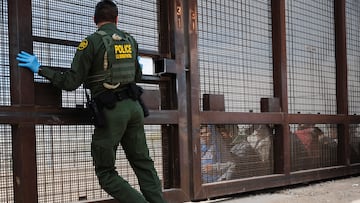New anti-immigrant law in Texas: What to do if you are detained and how to be prepared
A federal appeals court has put the Texas SB4 law back on hold. If the law is finally implemented, here are some tips on what to do if you are detained.

SB4, the law that allows Texas officials to detain and prosecute individuals they think entered the country illegally, continues to wreak havoc in the state. In an attempt to stop the immigration crisis in the country’s southern border, the state government bypassed federal power and approved the legislation.
It is considered one of the harshest measures against the migrant community in the country. It came briefly into effect for a few hours after the US Supreme Court allowed Texas to enforce the law. However, a federal appeals court put the law back on hold.
Through this new legislation, local and state authorities are given permission to arrest undocumented immigrants. Currently, local police need the consent of the federal government to carry out any type of immigration arrest since, typically, this is the branch in charge of enforcement and repatriation, if necessary.
Arrested immigrants would be stripped of their right to a fair trial and could be prosecuted for first-degree felonies (180 days to five years in prison), depending on their criminal history. The penalty would increase to serious crimes of the second degree (between 2 and 20 years in prison) if people resist arrest.
As the legislation remains under review, the court can change its status at any time. It would be wise to stay informed of any court decision to avoid being caught off guard.
After the Supreme Court temporarily permitted Texas state and local police to arrest and detain migrants crossing the border illegally under SB4, an appeals court has halted the immigration law. pic.twitter.com/wNLW6RA4JX
— CBS Evening News (@CBSEveningNews) March 20, 2024
New anti-immigrant law in Texas: What to do if you are detained
Immigration lawyers recommend that undocumented immigrants in Texas stay informed about their rights. Here is some advice from experts on what to do if the law comes into force again and you are accosted by authorities.
According to Jose Jordan, an immigration attorney from Los Angeles, California, the first thing you should do when faced with an arrest is to stay calm. The second thing is to remain silent. If a police officer stops you and questions you about your immigration status, Jordan recommends simply showing some identification, such as a driver’s license, and not giving out any information they might be able to use against you.
“Don’t be nervous. If you are stopped, you do not have to tell [the police officer] your immigration status... If they ask you about your immigration status, you can simply say: ‘[Based] on the information my lawyer gave me I don’t have to answer that question. With respect, I decline to respond’, and ask for a lawyer’”, advises Jordan through an interview with Telemundo Noticias.
READ ALSO: The mission of Chef José Andrés’ World Central Kitchen
Similarly, the American Civil Liberties Union (ACLU) emphasizes that when under arrest, you should only provide your name, address and date of birth, so you can reserve the right to remain silent and not reveal your immigration status. The ACLU also advises not to sign any type of document and not to make a decision without an attorney present.
Ezequiel Hernández, an immigration attorney in Phoenix, Arizona, suggests filming the arrests and urges the migrant community in Texas to “not move or abandon their jobs” for fear of being deported, according to statements collected by Univisión.
READ ALSO: US drops out of top 20 happiest countries
What about deportations?
The SB4 law has a big loophole: there is no clarity about the deportation process. When a person is detained for illegal crossing, it is usually the job of the federal government to return them to their country of origin. However, as it is a state law, there is no type of agreement for repatriation.
Related stories
According to Jordan, Texas plans to deport the detainees to Mexico. However, this goes against the agreements between the two countries, so the migrants would be left stranded. Mexico has called SB4 “anti-immigrant” and has said it would not accept anyone deported by Texas authorities.
“What Texas is saying is, basically, that they are going to leave them in the desert. If it were the federal government, they would send them back to their country... There are no laws that can say how this type of procedure [between Texas and Mexico] has to be done because they have never existed,” explained Jordan.


Complete your personal details to comment